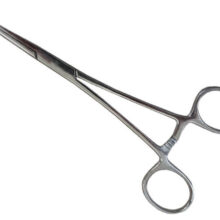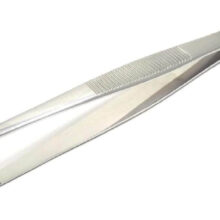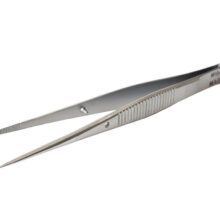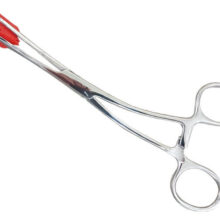Clamp Forceps
Se connecter pour obtenir les prix des revendeurs
Clamp forceps are used to control blood flow in order to cauterize wounds or ligate blood vessels.
Forceps are versatile and essential instruments used in various medical fields, including sports medicine. These handheld instruments, with their unique design and functionality, offer precision, control, and efficiency in a wide range of procedures.
In sports medicine, forceps play a crucial role in facilitating instrument-assisted procedures, aiding in tissue manipulation, extraction, and exploration. Let’s explore the significant role of forceps in sports medicine and their applications.
Forceps are frequently used in sports medicine to manipulate and grasp tissues during various procedures. Whether it’s extracting foreign bodies, repositioning structures, or holding tissues in place during suturing, forceps provide a firm grip and allow precise control.
The serrated or textured jaws of forceps enable secure grasping, minimizing the risk of slippage and improving the accuracy of tissue manipulation.
Injuries in sports can sometimes result in the penetration of foreign bodies, such as splinters, glass, or metal fragments, into soft tissues. Forceps are invaluable tools for extracting these foreign bodies, as they enable careful and controlled removal without causing further damage.
The fine tips and slender design of forceps facilitate access to the affected area and allow for the precise extraction of foreign objects, minimizing tissue trauma.
In sports medicine, forceps are commonly employed during wound exploration and debridement procedures. They assist in examining wounds, removing necrotic tissue, and cleaning debris. With their precise grip and maneuverability, forceps enable healthcare professionals to navigate complex wound contours and ensure thorough exploration and cleaning for optimal wound healing.
During suturing procedures, forceps are used to grasp and hold tissues together, providing stability and facilitating accurate needle placement. The grip and control offered by forceps allow for efficient and precise positioning of sutures, ensuring secure wound closure.
Additionally, forceps may be utilized to manipulate suture materials, aid in knot tying, or assist with securing wound dressings.
In sports medicine, arthroscopy is a common minimally invasive procedure used to visualize and treat joint-related injuries. Forceps specifically designed for arthroscopic use allow for delicate manipulation of structures within the joint space. They aid in tissue retraction, removal of loose bodies or debris, and the precise placement of sutures or anchors during repair procedures.
During procedures involving bleeding or vascular structures, forceps can be employed to achieve hemostasis and control bleeding. By carefully clamping blood vessels or applying pressure to specific points, forceps enable the temporary or permanent occlusion of vessels, helping to minimize bleeding and facilitate subsequent procedures.
It’s important to note that forceps come in various shapes, sizes, and designs, each tailored for specific applications. Different types of forceps, such as dressing forceps, tissue forceps, or needle holders, have unique characteristics to suit their intended purpose. Healthcare professionals specializing in sports medicine are trained to select the appropriate forceps based on the specific procedure, patient needs, and anatomical considerations.
In conclusion, forceps are indispensable instruments in sports medicine, providing precision, control, and efficiency in various procedures. From tissue manipulation and foreign body removal to wound exploration, suturing, and arthroscopic interventions, forceps play a vital role in enhancing the accuracy and effectiveness of instrument-assisted procedures.
The versatile applications of forceps in sports medicine contribute to improved patient outcomes, expedited recovery, and the overall advancement of musculoskeletal healthcare.

Se connecter pour obtenir les prix des revendeurs
Clamp forceps are used to control blood flow in order to cauterize wounds or ligate blood vessels.

Se connecter pour obtenir les prix des revendeurs
Dressing forceps are used when dressing wounds. They hold gauze and other dressings. They may also be used to remove infected or dead tissue or debris from the wound.

Se connecter pour obtenir les prix des revendeurs
Common uses for splinter forceps include removing small fragments from a wound, removal and placement of wound closure strips, suture removal and holding suture ends prior to cutting.

Se connecter pour obtenir les prix des revendeurs
Tongue forceps are used to give health care professionals a clear view of the tongue when this is needed for treatment.